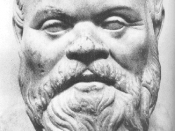Empiricists believe that all ideas come from experience. Some empiricists even believe there are no innate ideas. That the mind is a blank tablet from birth, waiting to be filled with the knowledge you will gain from your experiences. So, the truths or propositions that make up our knowledge consist of ideas that have come to us exclusively through our senses. However, some empiricists recognise the inner sense e.g. emotions, sensations, feelings and memories, as well as the outer senses e.g. sight and hearing. This means that they accept that experience includes more than just sense perception, and that these introspective senses also shape our knowledge of things.
There are, however, two simple slogans rooted firmly in the sensory realm that can summarise the empiricist stance without too much caricature. 'Seeing is believing' and 'nothing in the mind that has not first been in the senses'. This is quite an extreme view of empiricism, and could suggest that there is no such thing as a priori knowledge, that all knowledge is a posteriori.
Empiricists see philosophical scepticism as limiting what the human mind can hope to accomplish and as a guide to those areas of inquiry we can usefully apply our talents towards. So although they may agree it can help us in our eternal quest for knowledge, the view is that it should not be overly used, otherwise it would cause you to be lead into what's known as an 'infinite regress', and only delaying the 'truth' being found.


